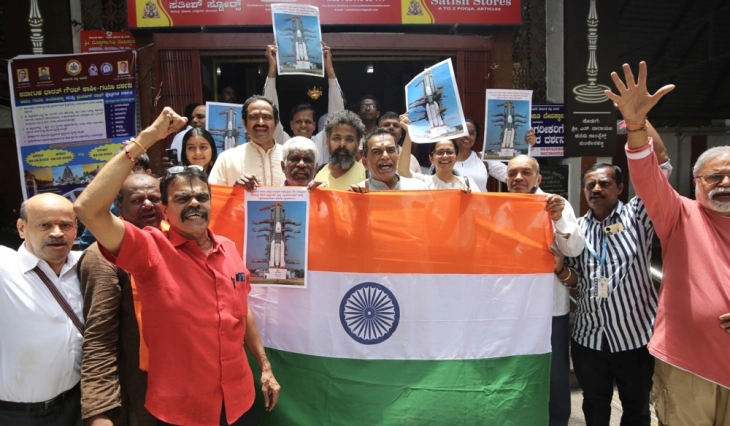Jubilant India becomes fourth country to land on the moon
- India landed a spacecraft safely on the moon, making it only the fourth country to achieve such a feat and after a similar attempt by Russia failed just days ago.
- Post By Magdalena Reed
- 20:11, 23 August, 2023

New Delhi, 23 August 2023 (dpa/MIA) — India landed a spacecraft safely on the moon, making it only the fourth country to achieve such a feat and after a similar attempt by Russia failed just days ago.
"Chandrayaan-3 has successfully soft-landed on the moon," the Indian Space Research Organisation (ISRO) posted on X, the platform formerly known as Twitter. Chandrayaan means "lunar vehicle" in Sanskrit.
Now that it has landed near the moon's south pole, the unmanned probe is set to explore the area for around two weeks, which scientists say may hold ice and valuable minerals.
The United States, the Soviet Union and China had previously been the only countries to safely land a lunar spacecraft.
Soft landings are notoriously difficult, as they involve a dramatic reduction in speed from the enormous power needed to rocket spacecraft towards their target down to zero, without destroying the technology involved.
The Vikram lander that touched down on the lunar surface carries the six-wheeled Pragyan rover.
Scientists believe craters that are permanently in shadow on the dark side of the moon may hold frozen water.
"India is on the moon," ISRO chief Sreedhara Panicker Somanath said in to cheers in the mission control room.
It was a "historic day," said Prime Minister Narendra Modi who tuned in from a summit in South Africa.
The probe took off on July 14, launched from the Satish Dhawan Space Station in the state of Andhra Pradesh. It first orbited the Earth and then switched to a lunar orbit.
India's success comes just days after a Russian lunar probe failed.
Space probe Luna-25 slammed into the moon's surface after an "unplanned situation" and was destroyed, space agency Roscosmos said on Sunday.
Luna-25 was also supposed to land near the moon's south pole, in what was Russia's first lunar mission in almost 50 years.
India's first journey failed in 2019, when the landing module crashed onto the moon's surface due to problems with the brakes during its final approach.
Wednesday's success followed ISRO fixing the problems revealed by previous missions, agency said.
The first probe, "Chandrayaan-1," was launched in 2008 and orbited the moon without landing on it.
"Unbelievable!" European space agency chief Josef Aschbacher wrote on X. "Congratulations to ISRO, Chandrayaan3 and all the people of India!!"
Alongside further congratulations, NASA chief Bill Nelson said "We are glad to be your partner in this mission," likewise in a post on X.
Scientists hope that findings such as ice from the current mission could support future, manned lunar missions.
"Such missions are future-oriented," said Ajey Lele of the Manohar Parrikar Institute for Defence Studies and Analyses in New Delhi. "You have to start today if you want to achieve your goal in two, three decades."
India launched its space programme in the 1960s, and initially focused mainly on getting satellites into space without excessive expense.
However, the ISRO's later missions have become more ambitious and when Modi visited US President Joe Biden, they announced plans for greater cooperation in space.
Lunar exploration began in the 1950s during the Cold War amid fevered competition between the US and former Soviet Union.
The Soviets landed an unmanned probe on the moon in 1959.
The US managed 10 years later with Apollo 11, the first manned mission.
Then, two years ago, China sent a capsule to the moon and managed to collect rock samples.
Another manned mission to the moon is planned in the US' Artemis project.
Meanwhile state space agencies have been joined by private companies who are also trying to manage lunar landings.
A recent, privately financed moon landing failed in April when Japanese company Ispace's Hakuto-R probe crashed onto the lunar surface, one of a series of failed private attempts.
Two US companies are planning the next private lunar missions, with Astrobotic and Intuitive Machines seeking landings, independently of one another, driven by the prospect of providing cargo delivery services to the moon, a potentially profitable business.







